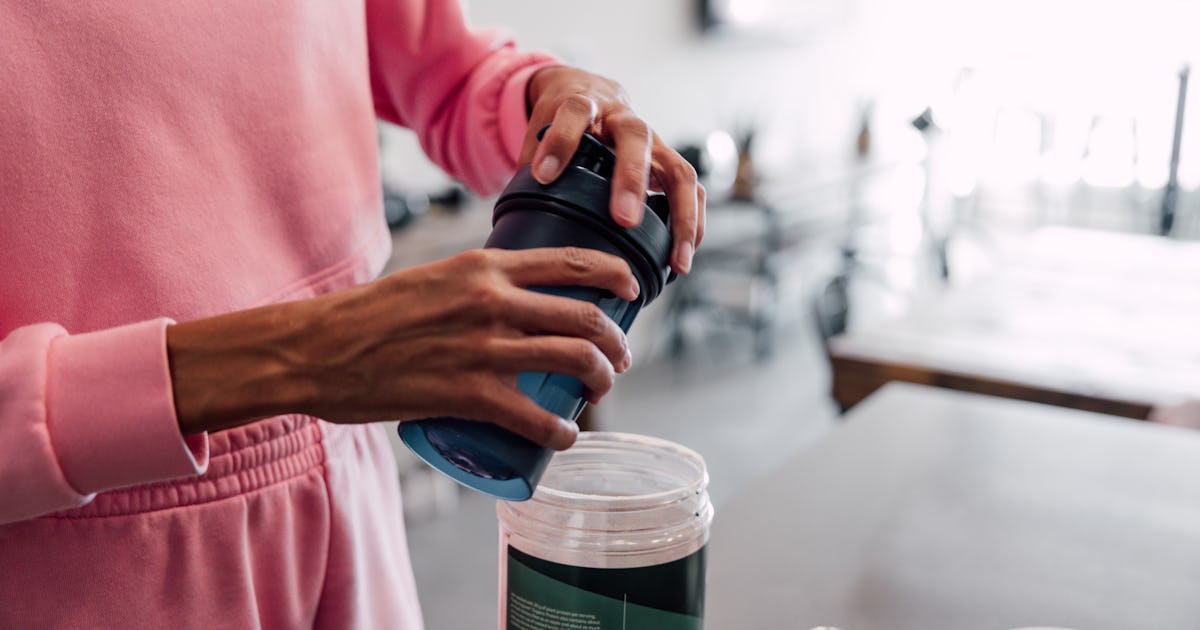OK, OK, I know, we’re not supposed to believe everything we see on TikTok. But lately, my For You Page has been flooded with women — ones who actually look my age, instead of the usual early 20s fitness girlies — talking about taking creatine. As far as I knew, creatine was something musclehead dudes were taking in excess so their traps would touch their ear lobes, but these ladies were talking about how it can help you through menopause. Excuse me? So, I asked dietary and women’s health experts what we know about creatine, and more specifically, the benefits of taking creatine for women.
What is creatine, exactly?
Creatine is a compound that exists in many of our organs. To make a long biological process short, our cells use something called ATP for energy to power things like muscle use and brain functions, according to Dr. Jessica Nazzaro, board-certified OB-GYN, certified menopause practitioner, and medical advisor at Mira. Creatine helps regenerate that ATP “during times of high energy demand.” She says this process “is especially active in skeletal muscle, heart muscle, and even the brain.”
So, if you are someone who works out, creatine can help you feel like you have a little more gas in the tank during your gym sesh.
What are the benefits of taking creatine for women?
We all associate taking creatine with building muscle, and that is one of its benefits. Experts agree that creatine is the most studied supplement out there for this purpose, and it has been shown to be safe and effective, according to the International Society of Sports Nutrition. But newer studies have revealed it’s capable of a lot more than helping you bulk up your biceps.
Physical Health
“Recent studies have found that creatine may positively affect brain health, mental health, and athletic performance,” says Kristin Kirkpatrick, MS, RDN, a registered dietitian at the Cleveland Clinic Department of Wellness & Preventive Medicine. “Creatine may further play a role in mitigating the negative impact of sleep deprivation as well as enhance blood sugar management. Research also indicates that creatine supplementation may even benefitindividuals with Huntington’s disease, a neurological disease characterized by the progressive breakdown of cells in the brain.”
Cognitive Function
Struggling with fatigue and brain fog? I certainly do, as a mom with fibromyalgia, a full-time job, and a front-row seat to watch the collapse of society. And I’m willing to try something other than caffeine to help.
“Creatine plays a significant role in brain health, particularly in the frontal cortex, which governs decision-making, attention, and memory. By supporting ATP regeneration, creatine helps fuel these cognitively demanding processes,” Nazzaro says.
Mental Well-Being
There’s also growing evidence linking creatine to mood support.
“For women, depression risk often increases during hormonally volatile life phases — puberty, pregnancy, postpartum, and menopause. Interestingly, studies have found a positive correlation between creatine levels in the spinal fluid and neurotransmitters like dopamine and serotonin, which are associated with mood regulation. In studies involving adolescent and adult females on antidepressants, creatine supplementation improved depression scores when added to their treatment regimen,” Nazzaro says. Not saying it’ll replace your Lexapro, but hey, who couldn’t use a little extra help in the mental health department in 2025?
Menopause Support
“Creatine is especially valuable for women in perimenopause and menopause, both for muscle preservation and cognitive health,” Nazzaro says. “Women begin losing muscle mass in their 30s and 40s, and the rate of loss accelerates in their 60s and beyond, potentially reaching up to 8% per decade. Creatine, combined with resistance training, offers a proactive way to preserve and build muscle mass during this transitional time.”
Maintaining muscle is critical, she says — not just for strength, but also for balance, reactivity, and metabolic health, including blood sugar and fat regulation. “Over 70% of osteoporotic hip fractures occur in women, making it vital to maintain the strength needed to recover from stumbles and avoid falls. For menopausal women, creatine offers a unique opportunity to slow down age-related decline and enhance quality of life,” Nazzaro says.
What are the side effects of creatine for women?
Mount Sinai’s website says the side effects of taking creatine may include:
- Diarrhea
- Dizziness
- High blood pressure
- Kidney damage
- Liver dysfunction
- Muscle cramps, strains, and pulls
- Stomach upset
- Weight gain
For these reasons, Mount Sinai also advises that “people with kidney disease, high blood pressure, or liver disease should not take creatine.”
Kirkpatrick recommends creatine HCl for her patients, saying it is “more soluble” and seems to lead to fewer side effects than creatine monohydrate.
How much creatine should you take?
For starters, you should always talk to your doctor before adding any new supplement to your regimen, including creatine. This is because it can interact with certain medications and may not be appropriate for people with kidney conditions, according to Mount Sinai. There also haven’t yet been well-designed clinical trials on how safe it is to take creatine while pregnant or breastfeeding.
Kirkpatrick says your provider will help you decide the right starting dose for you and when you should take it, based on your health status, goals, and other lifestyle factors.
Nazarro says for some people, there’s benefit in starting with “a loading phase” — 20 grams per day for five days, split into four doses. “After that, most people move to a maintenance dose of three to five grams per day,” she says. And because creatine pulls water into the muscles, Nazzaro says it’s essential to stay well-hydrated. “A good rule of thumb is to add an extra 16 to 24 ounces of water per day while supplementing with creatine, especially during the loading phase.”
It’s important to remember that creatine isn’t “a magic pill,” she adds — it’s muscle- and bone-related benefits really only come to bear if you have a consistent strength training routine. But if you’re thinking about your longevity and overall health — or you’re just seeing all the chatter on TikTok — it could be worth bringing up creatine with your healthcare provider.



